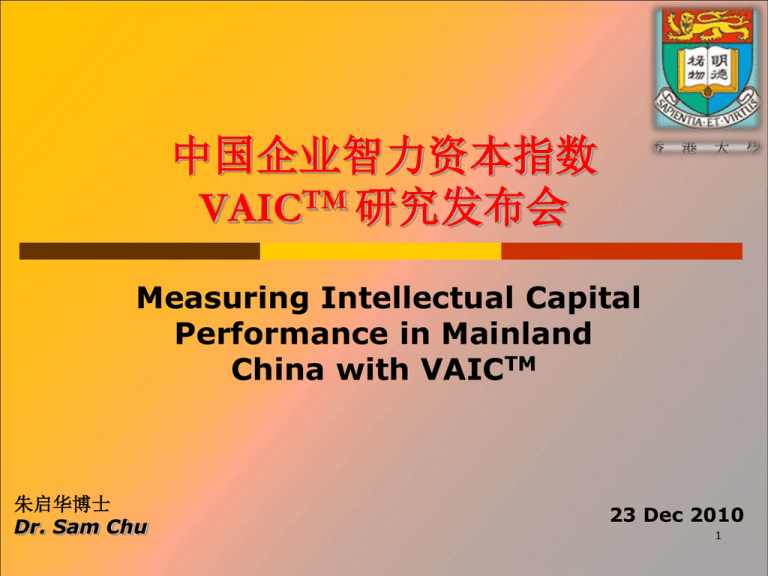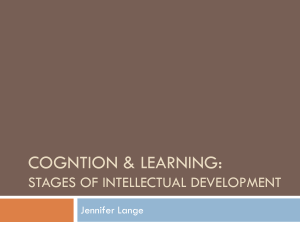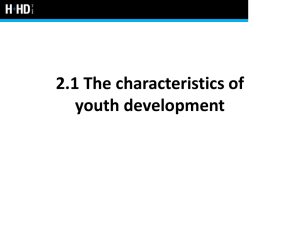Literature Review (文献回顾)
advertisement

中国企业智力资本指数 VAICTM 研究发布会 Measuring Intellectual Capital Performance in Mainland China with VAICTM 朱启华博士 Dr. Sam Chu 23 Dec 2010 1 Agenda Introduction (简介) Literature Review (文献回顾) 10 Companies with highest VAICTM among CSI 100 Knowledge Management (知识管理) References (参考文献) 2 Introduction 简介 1 Economy Worldwide is transforming into a knowledge-based economy 全球经济正在转型为知识型经济 economic value (经济价值) is derived from intellectual capital (智力资本IC), rather than physical capital (物质资本) (Sveiby 1997; Pulic 1998; Bontis 2001; Chen st al. 2005) way of value creation in new economy is shifting traditional accounting measures no longer adequate in reflecting companies true performance 传统的会计核算办法不再足以反映公司 3 的真实业绩 Introduction 简介 2 Different IC models and valuations methods 不同的智力资本模型和估值方法 To better reflect the invisible value (无形价值) not captured in financial statements (财务报表) (Lev & Zarowin 1999; Edvinsson & Malone 1997) Forty-two valuation methodologies(42类型估值方法) on measuring intangible assets (无形资产) (Sveiby 2010) 4 Introduction 简介 3 Seems to have a Relationship between IC and business performance (智力资本和经营业绩似乎有关系) (Firer & Williams 2003; Chen et al. 2005; Shiu 2006; Chan 2009b; Zéghal & Maaloul 2010) 5 Introduction 简介 4 Prior IC studies focused on companies in Europe and North America 以前的智力资本研究重点着重在欧洲和北美企业 (Pulic 2000b; Zéghal & Maaloul 2010; Nazari & Herremans 2007; Riahi-Belkaoui 2003) emerging economies (e.g. China) are gaining global importance 新兴经济体(例如中国)对全球经济越来越重要 China second-largest economy in the world (第二大经济强国) The world’s number one exporter (世界头号出口国) (CIA, 2010a)6 Introduction 简介 – Why this study? Lack of IC studies in Mainland China 中国大陆缺乏智力资本研究 This study aims to 这项研究的目的是 investigate on the current status (研究目前大陆 的业务表现状况) of IC performance of businesses in mainland China Heightening the awareness for corporate leaders (提高企业领导的意识) to manage intellectual capital utilization in their organizations 7 Agenda Introduction (简介) Literature Review (文献回顾) 10 Companies with highest VAICTM among CSI 100 Knowledge Management? (知识管理) References (参考文献) 8 Literature Review 文献回顾 1 Intellectual Capital (智力资本) The concept of intellectual capital (IC) first appeared in a book published in 1836 by Nassau William Senior 智力资本的概念(IC)首次出现在西尼尔 (Senior)的出 版书 No single definition of IC 没有单一的定义 evolved from different academic disciplines 从不同的学科演化 (Marr, 2007) 9 Literature Review 文献回顾 2 Intellectual Capital A tripartite model for IC, comprising human capital (人力资本) external capital (外部资本) (e.g. relationships with customers and suppliers) internal capital (內部资本) (e.g. patents, technology and systems) (Sveiby, 1997) 10 Suresh Cuganesan 2000 Literature Review 文献回顾 3 Intellectual Capital IC – economic value of structural capital and human capital of a company 一家公司在结构资本和人力资的本经济价值 (Petty and Guthrie, 2000) Human capital (人力资本) is “the individual knowledge stock of an organization as represented by its employees.” (Bontis, 2000, p. 87) 11 Literature Review 文献回顾 4 Intellectual Capital Structural capital (结构资本)= all nonhuman storehouses of knowledge in organizations including databases资料库 organizational charts组织 process manuals strategies策略 routines常规 & anything whose value to the company is higher than its material value (Bontis et al., 2000) 12 Literature Review 文献回顾 5 Intellectual Capital Reviewed the 25 methods to measure the value of intangible assets (无形资产), and grouped them under four categories (类别): financial valuation 财务估值 value measurement 价值计量 value assessment 价值评估 Measurement 计量 (Andriessen, 2004) 13 Literature Review 文献回顾 6 Intellectual Capital Some of the more well-known methods 一些较常见的方法 Economic value addedTM (经济增值), Market-tobook value, and VAICTM are categorized as financial valuation methods (财务估值法). (Andriessen, 2004) 14 Literature Review 文献回顾 7 Intellectual Capital Sveiby (2010) classified various methodologies into 4 categories 分为四类方法 : return-on-assets methods (资产回报 ROA) direct intellectual capital methods (直接演算法) market capitalization methods (市场资本化法) scorecard methods (记分卡法) 15 Literature Review 文献回顾 8 Intellectual Capital VAICTM is best fit under the ROA method category (最合适的分类方法), useful to illustrate the financial value of intangible assets 对于说明无形资产的财务价值是有用的 can be compared between same-sector companies (比较同业) (Sveiby, 2010) 16 Literature Review 文献回顾 1 VAICTM Methodology Value added intellectual coefficient (智力增 值系数 VAICTM), developed by Ante Pulic, is a valuation methodology to assess the efficiency of key resources in business organizations (评估企业关键资源的效率) (Pulic, 2000a). adding value and creating wealth through 通过以下来增加价值和创造财富 employing physical capital 采用实物资本, human capital 人力资本, structural capital 结构资本 17 Literature Review 文献回顾 2 VAICTM Methodology The key assumption (关键假设) is that human capital is an investment, not a cost 是人力资本是一种投资,而不是成本. Value-added增值 = Output输出 – Input输入 Value-added intellectual coefficient defined through its components: human capital coefficient人力资本系数, structural capital coefficient结构资本系数, physical capital employed coefficient物质资本系数 18 Literature Review 文献回顾 3 VAICTM Methodology Business managers have an indicator with which to study and monitor the company’s value creation efficiency due to IC 业务经理透过在智力资本的指标,用以研究和监测该公司 的价值创造的效率 19 Literature Review 文献回顾 4 VAICTM Methodology Five steps for calculation VAICTM五个计算步骤 (Pulic 2000a; Kujansivu & Lonnqvist 2007; Chan 2009a) Step 1 Calculate value added (计算增值 VA): VA = Output – Input where “Output” represents total income from all the products and services sold on the market (从所有在市场上出售的产品和服 务的收入) and “Input” contains all the expenses incurred in earning the revenue except manpower costs(除了人力成本,所 20 有赚取的收入的开支), as they are treated as investments. Literature Review 文献回顾 5 VAICTM Methodology ) VA = R + DD + T + EC + D + A Step 1 = OP + EC + D + A Calculate value added (VA): VA = Output – Input where R = retained earnings(保留溢利); DD = dividends (红利); T = taxes(税项); EC = total employee expenses viewed as investments(被视为投资的总员工开支) ; D + A = depreciation and amortization(折旧及摊销); and OP = Operating profit (营业利润) 21 Literature Review 文献回顾 6 VAICTM Methodology Step 2 Calculate human capital efficiency 计算人力资本效率 (HCE): HCE is expressed as the amount of value-added generated per monetary unit invested in manpower (每投入人力货币单位的增值生产): HCE = VA / HC HC represents human capital, may be calculated using “payroll costs 薪酬成本” (Pulic, 2000a) 22 Literature Review 文献回顾 7 VAICTM Methodology Step 3 Calculate structural capital efficiency 计算结构资本效率 (SCE): SCE = SC / VA SC (structural capital) = VA – HC SCE – proportion of total value added accounted for by structural capital (总增加值占资本结构的比重). 23 Literature Review 文献回顾 8 VAICTM Methodology Step 4 Calculate capital employed efficiency 运用资本的效率计算 (CEE): CEE = VA / CE CE = book value of firm’s net assets (such as physical assets and financial capital), which is a proxy for tangible resources. 公司账面价值的净资产(如实物资产和金融资本)是一个有形资源 的代表 24 Literature Review 文献回顾 9 VAICTM Methodology Step 5 Calculate VAICTM: VAICTM = HCE + SCE + CEE Sum of the results from steps 2 to 4 从步骤2到4结果的总和 25 Literature Review 文献回顾 Limitations 限制 of the VAICTM Methodology Inability to handle companies with negative book value of equity (负账面资产值)or negative operating profit (负营运利润) Interactions among the components of intellectual capital (Bontis et al., 2000) 26 Literature Review 文献回顾 Advantages for using 使用的优点 VAICTM Apply widely in different contexts 广泛应用在不同情况 due to its ease of administration 由于其易于管理 Objective and financially-based measure of IC efficiency as it makes use of audited financial data (经审计的财务数据) (Chan, 2009a) Standardized and objective measurement (标准化和客观测量) 27 (Firer and Williams, 2003) Literature Review 文献回顾 Prior studies of IC outside Mainland China UK - Taiwan - India - Zéghal and Maaloul (2010) investigated whether or not there was a correlation between IC and corporate performance in 300 UK businesses using data from the year 2005. They found a positive relationship with economic and financial performance only in high-tech industries. intellectual capital had a positive impact on market value and financial performance (Chen et al., 2005). high correlation between VAICTM score and business survival Most of the surveyed banks with low VAICTM score were subsequently merged, liquated, or even ceased operation. 28 Literature Review 文献回顾 1 Prior studies of IC in Hong Kong Petty & Cuganesan (2005) did content analysis of 250 annual reports collected in three different years (1992, 1998, and 2002) Low levels (水平低) of voluntary IC disclosure, but grew over time company financial success was positively correlated (呈正相关) with voluntary IC disclosure higher level of growth was observed in companies which voluntarily disclosed their IC in their annual reports. 29 Literature Review 文献回顾 2 Prior studies of IC in Hong Kong Chan (2009a, 2009b) laid the groundwork (奠定基础) for IC research and developed the framework for empirical IC studies in Hong Kong no strong association (并无强烈关联) between IC and four corporate financial indicators in constituent companies of the Hang Seng Index for 2001 - 2005 moderate association was found between the individual components of IC and corporate financial indicators 30 Literature Review 文献回顾 3 Prior studies of IC in Hong Kong Chu, Chan & Wu (2011) studied the constituent companies of the Hang Seng Index for 2001 2009 As measured by VAICTM, IC was positively associated with profitability of businesses. 计量VAICTM,与企业盈利能力呈正关联 In particular, structural capital, a key component of IC, played a notable part in enhancing corporate profitability 结构资本对于提升企业盈利能力起到了显着的部分 31 Literature Review 文献回顾 Literature gap: Can’t find IC studies for mainland China 找不到在中国的智力资本研究 32 Agenda Introduction (简介) Literature Review (文献回顾) 10 Companies with highest VAICTM among CSI 100 Knowledge Management (知识管理) References (参考文献) 33 Top 10 companies with the highest VAICTM among CSI 100 for year 2009 ID Entity name CSRC Sector HCE SCE CEE ICE VAIC 上海陆家嘴金融贸易区开发股份有 限公司 Shanghai Lujiazui Finance and 600663 Trade Zone Development Co Ltd Real estate 33.135 0.970 0.128 34.105 34.233 泸州老窖股份有限公司 000568 Lu Zhou Lao Jiao Co., Ltd Manufacturing (Food & Beverage) 12.607 0.921 0.430 13.527 13.958 中国长江电力股份有限公司 600900 China Yangtze Power Co Ltd Utilities 11.351 0.912 0.054 12.263 12.317 保利房地产(集团)股份有限公司 600048 Poly Real Estate Group Co., Ltd Real estate 11.059 0.910 0.065 11.969 12.033 申能股份有限公司 600642 Shenergy Co Ltd Utilities 10.385 0.904 0.131 11.289 11.420 山东高速公路股份有限公司 600350 Shandong Expressway Co Ltd Transportation 8.927 0.888 0.288 9.815 10.103 金融街控股股份有限公司 000402 Financial Street Holdings Co., Ltd Real estate 8.894 0.888 0.053 9.782 9.835 青海盐湖钾肥股份有限公司 000792 Qinghai Salt Lake Potash Co., Ltd Manufacturing (Petrochemicals) 8.139 0.877 0.268 9.016 9.284 中国国际航空股份有限公司 601111 Air China Ltd Transportation 7.917 0.874 0.123 8.791 8.914 紫金矿业集团股份有限公司 601899 Zijin Mining Group Co Ltd Mining 7.754 0.871 0.286 8.625 8.910 34 Agenda Introduction (简介) Literature Review (文献回顾) 10 Companies with highest VAICTM among CSI 100 Knowledge Management (知识管理) References (参考文献) 35 What is KM? KM is the systematic(系統化), explicit and deliberate building, renewal and application of knowledge to maximize an enterprise’s knowledge-related effectiveness and returns from knowledge assets (知识资产) (Karl Wiig, 1997) 36 Intellectual Capital and Knowledge Management 智力资本与知识管理 Hermans (2005) 37 Next Phase of research下一阶段研究: Linking IC to KM Survey & interview mainland companies’ investment in IC and KM 统计调查及采访大陆企业在智力资本和知识管理 的投资 38 Contact me Questions? 答问时间! Dr. Sam Chu 朱启华博士 Assistant Professor 助理教授 Division of Information & Technology Studies Deputy Director, CITE Faculty of Education, The University of Hong Kong Pokfulam Road, Hong Kong. Tel: (852) 2241-5894 Email: samchu@hku.hk Homepage: http://web.edu.hku.hk/academic_staff.php?staffId=samchu 39 40 References 1 Andriessen, D. (2004), Making sense of intellectual capital: designing a method for the valuation of intangibles, Elsevier Butterworth-Heinemann, Burlington, MA. Bontis, N., Keow, W. and Richardson, S. (2000), “Intellectual capital and business performance in Malaysian industries”, Journal of Intellectual Capital, Vol. 1 No. 1, pp. 85-100. Bontis, N. (2001), “Assessing knowledge assets: a review of the models used to measure intellectual capital”, International Journal of Management Reviews, Vol. 3 No.1, pp. 41-60. Census and Statistics Department, HKSAR (2009), Hong Kong social and economic trends – 2009 edition. Census and Statistics Department, HKSAR. Central Intelligence Agency (2010a), “East & Southeast Asia: China”, The World Factbook, available at: https://www.cia.gov/library/publications/the-world-factbook/geos/ch.html (accessed 25 November 2010). Central Intelligence Agency (2010b), “East & Southeast Asia: Hong Kong”, The World Factbook, available at: https://www.cia.gov/library/publications/the-world-factbook/geos/hk.html (accessed 25 Novemeber 2010). Chan, K, H. (2009a), “Impact of intellectual capital on organizational performance: An empirical study of companies in the Hang Seng Index (Part 1)”, The Learning Organization, Vol. 16 No. 1, pp. 4-12. Chan, K, H. (2009b), “Impact of intellectual capital on organizational performance: An empirical study of companies in the Hang Seng Index (Part 2)”, The Learning Organization, Vol. 16 No. 1, pp. 22-39. Chen, M., Cheng, S. and Hwang, Y. (2005), “An empirical investigation of the relationship between intellectual capital and firms' market value and financial performance”, Journal of Intellectual Capital, Vol. 6 No.2, pp. 159-176. Cohen, J. (1988), Statistical power analysis for the behavioral sciences (2nd ed.). Lawrence 41 Erlbaum, New Jersey. References 2 Edvinsson, L. and Malone, M.S. (1997), Intellectual Capital: Realizing Your Company’s True Value by Finding Its Hidden Brainpower, Harper Business, New York, NY. Firer, S. and Williams, M. (2003), “Intellectual capital and traditional measures of corporate performance”, Journal of Intellectual Capital, Vol. 4 No. 3, pp. 348-360. Hong Kong Information Services Department (2010), “Hong Kong as major gateway to China”, available at: http://www.info.gov.hk/gia/general/201002/25/P201002250146.htm (accessed 8 September 2010). Hong Kong Tourism Board (2008). “Gateway to China and key Asian markets”, available at: http://www.discoverhongkong.com/mice/eng/html/exhibitions/exhibitions-china-gateway.html (accessed 8 September 2010). HSBC (2010), “Hong Kong – the Gateway to China”, available at: http://www.hsbc.com.hk/1/PA_1_3_S5/content/greaterchina/pdf/gateway2china.pdf (accessed 24 November 2010). InvestHK – The Government of the Hong Kong Special Administrative Region (2010), “Gateway to Mainland China”, available at: http://www.investhk.gov.hk/default_bodies/whyhk/en_gateway.html (accessed 23 November 2010). Lamy, P. (2010), “Reshuffling the Deck of Global Economic Cards”, Special Address for the Bahrain Global Forum at the IISS Geo-economic Strategy Summit, Manama, Bahrain, available at: http://www.iiss.org/conferences/bahrain-global-forum/bahrain-global-forum-2010/speeches/specialaddress/special-address-pascal-lamy/ (accessed 25November 2010). Lee, Lin and Tsui (2009), “Home country effects of foreign direct investment: from a small economy to a large economy”, Economic Modelling, Vol. 26 No. 5, pp. 1121-1128. Lev, B. and Zarowin, P. (1999), “The boundaries of financial reporting and how to extend them”, Journal of Accounting Research, Vol. 37 No. 2, pp. 353-385. Marr, B. (2007), “What is intellectual capital?”, in L. A. Joia (Ed.), Strategies for information technology and intellectual capital, Idea Group Pub., Hershey, PA, pp. 1-9. Nazari, J. and Herremans, I. (2007), “Extended VAIC model: measuring intellectual capital components”, 42 Journal of Intellectual Capital, Vol. 8 No. 4, pp. 595-609. References 3 Kamath, G. B. (2007), “The intellectual capital performance of Indian banking sector”, Journal of Intellectual Capital, Vol. 8 No. 1, pp. 96-123. Kaplan, R. and Norton, D. (2004), Strategy maps: converting intangible assets into tangible outcomes, Harvard Business School Publishing Corporation, Boston, MA. Kujansivu, P. and Lonnqvist, A. (2007), “Investigating the value and efficiency of intellectual capital”, Journal of Intellectual Capital, Vol. 8 No. 2, pp. 272-287. Oxford Journals (n.d.), “Regression Diagnostics”, Research Methods II: Multivariate Analysis, available at: http://www.oxfordjournals.org/our_journals/tropej/online/ma_chap5.pdf (accessed 10 June 2010). Petty, R., and Guthrie, J. (2000), “Intellectual capital literature review – measurement, reporting and management”, Journal of Intellectual Capital, Vol. 1 No. 2, pp. 155-176. Petty, R., and Cuganesan, S. (2005), “Voluntary disclosure of intellectual capital by Hong Kong companies: Examining size, industry and growth effects over time”, Australian Accounting Review, Vol. 15 No. 2, pp. 4050. Pulic, A. (1998), “Measuring the performance of intellectual potential in knowledge economy”, paper presented at the 2nd McMaster World Congress on Measuring and Managing Intellectual Capital by the Austrian Team for Intellectual Potential, February 1998, available at: http://www.vaicon.net/download/Papers/Measuring%20the%20Performance%20of%20Intellectual%20Potential.pdf (accessed 17 February 2010) Pulic, A. and Bornemann, M. (1997), “The physical and intellectual capital of Austrian banks”, available at: http://www.vaicon.net/download/Papers/Physical%20and%20intellectual%20Capital%20of%20Austrain%20Banks.htm (accessed 18 February 2010) Pulic, A. (2000a), “VAIC – an accounting tool for IC management”, International Journal of Technology Management, Vol. 20 Nos. 5-8, 702-714. Pulic, A. (2000b), “MVA and VAIC analysis of randomly selected companies from FTSE 250”, available at: http://www.vaic-on.net/download/ftse30.pdf (accessed 17 February 2010) Riahi-Belkaoui, A. (2003), “Intellectual capital and firm performance of US multinational firms – a study of 43 the resource-based and stakeholder views”, Journal of Intellectual Capital, Vol. 4 No. 2, pp. 215-226. References 4 Shiu, H. (2006), “The application of the value added intellectual coefficient to measure corporate performance: evidence from technological firms”, International Journal of Management, Vol. 23 No. 2, pp. 356-65. Sveiby, K. E. (1997), The new organizational wealth: managing and measuring knowledge based assets, Berrett-Koehler, San Francisco, CA. Sveiby, K. E. (2010), “Method of measuring intangible assets”, available at: http://www.sveiby.com/articles/IntangibleMethods.htm (accessed 9 August 2010) Tan, H., Plowman, D. and Hancock, P. (2008), “The evolving research on intellectual capital”, Journal of Intellectual Capital, Vol. 9 No. 4, pp. 585-608. Zéghal, D. and Maaloul, A. (2010), “Analysing value added as an indicator of intellectual capital and its consequences on company performance”, Journal of Intellectual Capital, Vol. 11 No. 1, pp. 39-60. Z/Yen Group (2010), Global Financial Centres 7, City of London, London. Zagreb, 2007, Intellectual Capital Handbook of IC Management in Companies 44






